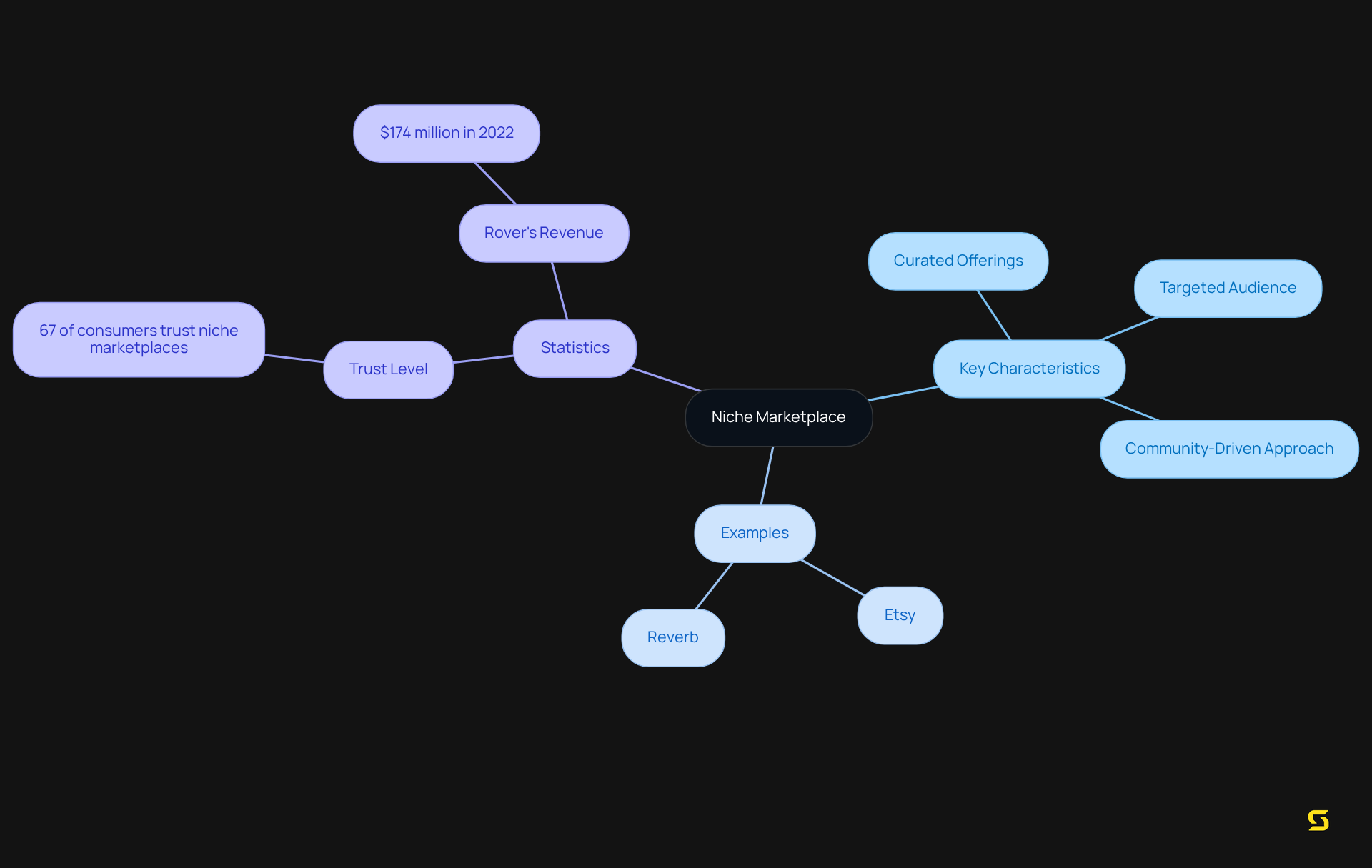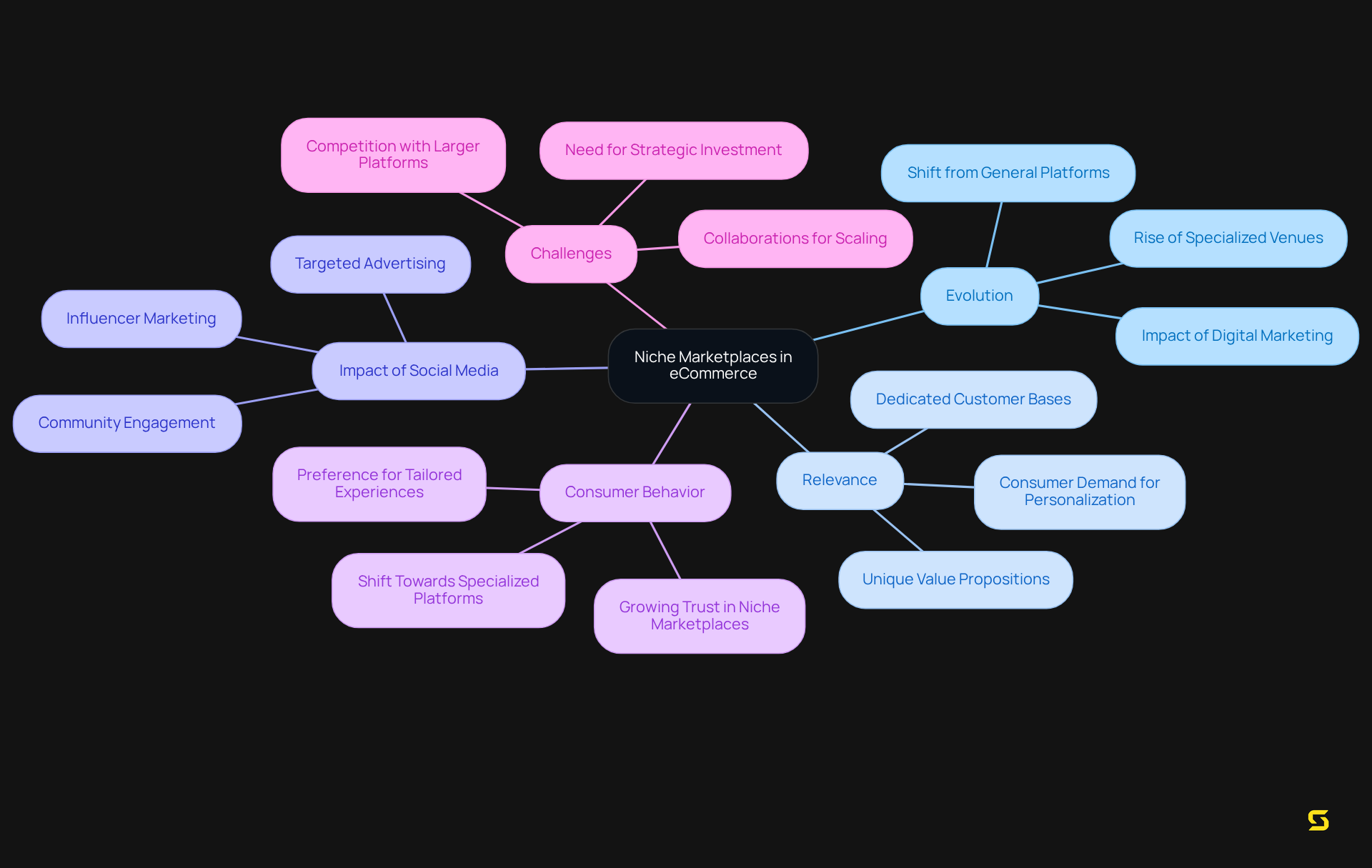Overview
Niche marketplaces represent specialized online platforms meticulously crafted to meet the distinct needs of specific buyer segments. These platforms not only offer curated products but also foster robust community engagement. The evolution and relevance of these marketplaces in the eCommerce landscape are noteworthy; they can achieve higher customer loyalty and conversion rates. However, they face significant challenges, including limited scalability and the imperative for continuous innovation. Understanding these dynamics is essential for leveraging the full potential of niche marketplaces.
Introduction
Niche marketplaces are fundamentally transforming the online shopping landscape by providing specialized platforms that address distinct consumer needs and preferences. As traditional eCommerce giants encounter mounting competition from these focused venues, the unique advantages of niche marketplaces—such as enhanced customer loyalty and targeted marketing—become increasingly apparent. Nevertheless, these benefits are accompanied by challenges, necessitating a thorough examination of how these platforms can sustain growth and relevance in a rapidly evolving digital marketplace. What strategies will empower niche marketplaces to flourish amidst the complexities of consumer behavior and market dynamics?
Define Niche Marketplace: Key Characteristics and Features
A niche marketplace serves as a specialized online space tailored to meet the unique needs, preferences, or traits of a specific segment of buyers. Unlike larger platforms that cater to a broad audience, these niche marketplaces focus on specialized products or services aimed at distinct demographics. Key features of a niche marketplace include:
- A curated selection of offerings
- A targeted audience
- A community-driven approach that fosters engagement and loyalty among users
For instance, platforms like Etsy cater to artisans and crafters, while Reverb specializes in connecting musicians with music gear. These platforms excel in creating connections between buyers and sellers in a niche marketplace who share common interests, thus enhancing the shopping experience and cultivating a sense of belonging. This focused approach not only drives customer retention but also allows brands to establish credibility and authority within the niche marketplace of their specific market segments.
Significantly, 67% of buyers trust niche marketplaces, emphasizing their efficiency and attractiveness. As Serge Khmelovskyi aptly states, 'While large platforms dominate the headlines, there's untold potential in focused, specialized venues.' Furthermore, the success of Rover, which reported a revenue increase to $174 million in 2022, exemplifies the benefits of honing in on a specific market segment. The rise of niche marketplaces is also a response to the 'unbundling' trend from larger services, allowing them to thrive by addressing specific buyer demands that are frequently overlooked.

Explore the Evolution and Relevance of Niche Marketplaces in eCommerce
Niche marketplaces have evolved significantly over the past two decades, emerging as a strategic response to the saturation of general eCommerce platforms. Initially, giants like eBay and Amazon dominated the online shopping landscape; however, as consumer preferences shifted towards personalized experiences, specialized venues began to flourish. The rise of social media and digital marketing has further propelled this trend, allowing tailored channels to effectively reach and engage their target audiences. Recent forecasts indicate that specialized platforms are poised to lead e-commerce by 2025, reflecting a substantial shift in buyer behavior.
Today, niche marketplaces are not just relevant; they are essential components of the eCommerce ecosystem, delivering unique value propositions that larger services cannot match. These platforms cater to specific interests, such as eco-friendly products or handmade goods, thereby attracting dedicated customer bases. For instance, platforms like Elfinic demonstrate how a niche marketplace can offer customized solutions that resonate with consumers seeking personalized shopping experiences. As Slava Bogdan, CEO of Flowwow, asserts, "Focused audiences and targeted strategies drive high sales conversion and brand loyalty."
The impact of social media on the growth of specialized markets cannot be overstated. It has revolutionized how businesses promote their offerings, facilitating targeted advertising and community engagement that fosters brand loyalty. As consumers increasingly pursue personalized shopping experiences, niche marketplaces are strategically positioned to capitalize on this demand, bolstering their growth and importance in the evolving eCommerce landscape. Nevertheless, these platforms face challenges, including the necessity for strategic investment and collaborations to scale effectively. With the emergence of social commerce, they are set to redefine online shopping, establishing themselves as vital components of future retail strategies.

Analyze the Benefits and Challenges of Niche Marketplaces
Niche marketplaces provide significant advantages, such as reduced competition, targeted marketing opportunities, and enhanced customer loyalty. By concentrating on a specific audience, businesses can tailor their offerings and marketing strategies to address the unique needs of their customers, resulting in higher conversion rates. For instance, a platform dedicated to sustainable products can attract environmentally conscious buyers willing to pay a premium for ethically sourced goods.
However, challenges also arise. Niche platforms may face limitations in scale, as their target audience is inherently smaller than that of broader platforms, potentially leading to dependence on a limited customer base. Furthermore, continuous innovation is essential to keep their offerings relevant and appealing to their audience. Striking a balance between these advantages and challenges is crucial for the success of niche marketplaces in a competitive landscape.
Effective promotional strategies, including strategic partnerships and influencer collaborations, are vital for overcoming these hurdles. Successful examples, such as StockX, which executed over 10 million transactions and achieved a valuation of $3.8 billion, illustrate how specialized platforms can thrive by leveraging unique offerings, community engagement, and differentiation through storytelling.
Moreover, projections indicate that niche marketplaces could capture over 40% of global e-commerce revenue by 2024, underscoring the significant growth potential in this niche marketplace sector.
![]()
Conclusion
Niche marketplaces represent a transformative approach within the eCommerce landscape, focusing on tailored solutions that cater to specific consumer segments. By honing in on specialized products and fostering community engagement, these platforms create unique shopping experiences that resonate deeply with dedicated audiences. The rise of niche marketplaces is not merely a trend; it signifies a fundamental shift in how consumers prefer to shop, emphasizing personalization and authenticity over broad offerings.
Throughout this article, key insights have highlighted the evolution of niche marketplaces from their inception to their current significance in the digital economy. The characteristics of these platforms—such as curated selections, targeted audiences, and community-driven initiatives—are pivotal in establishing brand loyalty and trust. Additionally, while the benefits of reduced competition and enhanced marketing opportunities are compelling, they are counterbalanced by challenges like scaling and the necessity for continuous innovation. Examples from successful platforms illustrate how niche markets can thrive through strategic partnerships and a strong understanding of their customer base.
As the eCommerce landscape continues to evolve, the potential for niche marketplaces to capture significant market share is undeniable. Projections suggest they could account for over 40% of global e-commerce revenue by 2024. Therefore, stakeholders must recognize the importance of these platforms. Embracing the unique advantages of niche marketplaces not only offers businesses a competitive edge but also aligns with the growing consumer demand for personalized and meaningful shopping experiences. Engaging with these specialized venues can lead to sustainable growth and a deeper connection with customers, shaping the future of retail in profound ways.
Frequently Asked Questions
What is a niche marketplace?
A niche marketplace is a specialized online platform designed to meet the unique needs and preferences of a specific segment of buyers, focusing on specialized products or services for distinct demographics.
How does a niche marketplace differ from larger platforms?
Unlike larger platforms that cater to a broad audience, niche marketplaces concentrate on specific offerings aimed at targeted audiences, fostering a more personalized shopping experience.
What are key characteristics of a niche marketplace?
Key characteristics include a curated selection of offerings, a targeted audience, and a community-driven approach that encourages user engagement and loyalty.
Can you provide examples of niche marketplaces?
Examples include Etsy, which caters to artisans and crafters, and Reverb, which connects musicians with music gear.
What benefits do niche marketplaces offer to buyers and sellers?
Niche marketplaces enhance the shopping experience by creating connections between buyers and sellers with common interests, driving customer retention, and allowing brands to establish credibility and authority in their specific market segments.
How much trust do buyers have in niche marketplaces?
Approximately 67% of buyers trust niche marketplaces, highlighting their efficiency and appeal.
What is the significance of the success of niche marketplaces?
The success of niche marketplaces, such as Rover's reported revenue increase to $174 million in 2022, illustrates the advantages of focusing on specific market segments and addressing buyer demands that are often overlooked.
What trend has contributed to the rise of niche marketplaces?
The rise of niche marketplaces is a response to the 'unbundling' trend from larger services, allowing them to thrive by focusing on particular buyer needs.





